Ring of Champions

The Club's Ring of Champions - a selection of 19 of the greatest players to have pulled on the Bulldogs jersey, as well as legendary Secretary and Chief Executive Peter Moore - was named in 2007 during the code's centenary celebrations.
The Ring of Champions is as follows in alphabetical order:
Chris Anderson, Ron Bailey, Greg Brentnall, Eddie Burns, Steve Folkes, David Gillespie, John Greaves, Les Johns, Peter Kelly, Roy Kirkaldy, Terry Lamb, Peter Moore, Chris Mortimer, Steve Mortimer, Edgar Newham, George Peponis, Henry Porter, Steve Price, Kevin Ryan, Frank Sponberg.
Chris Anderson (1971-1984)
Scouted by legendary centre Johnny Greaves, Chris Anderson (Bulldog no.375) joined Canterbury as a fullback in 1970, making his Club debut in the third-grade semi-final against St George.
The following season he became a regular member of the reserve grade team - with whom he won the 1971 Premiership - following a shift to the wing, before being promoted to make his first-grade debut against Parramatta.
Season 1974 proved to be Anderson's breakout year; he broke the Club's record for most tries in a season (16), and made his representative debuts for both City Seconds and NSW before playing in the Grand Final against Eastern Suburbs.
After returning from a brief stint with Widnes in the 1974-75 off-season, he was selected in the Australian World Cup squad.
The dynamic winger played eight games for NSW from 1974 to 1983, eight Tests for Australia from 1975 to 1982, and was a member of the 1978 and 1982 Kangaroo Tours, while also touring New Zealand in 1980.
From 1977 he held his position in first grade for the following eight seasons, which saw him feature in the 1979 Grand Final before being a member of 'The Entertainers' that ended Club's 38-year title drought in the emphatic 1980 Grand Final victory.

While injury and illness impacted his performances in 1981-82, he bounced back to be appointed Captain of the Bulldogs in 1983 - doing so on 27 occasions - scoring a record 19 tries and guiding the side to the Preliminary Final.
Following his departure from the Club midway through 1984 after 231 matches and a record 94 tries, Anderson began his coaching career in England and returned to Belmore to coach the Under 21s team in 1989.
In 1990 his first-grade coaching career at the Club kicked off, finding equal amounts of success with the clipboard in hand in an eight-year stint that bore two Minor Premierships, two Grand Final appearances and a Premiership in 1995.
His record 182 games as Head Coach of the Bulldogs was broken only by brother-in-law Steven Folkes.
His coaching career continued in Melbourne, which saw him win the 1999 Premiership, before coaching 18 Test teams for Australia from 1999-2003. He also held coaching roles with Cronulla, the Sydney Roosters and in UK rugby union.
A Life Member of the Football Club, Anderson was named on the wing in the Berries to Bulldogs 70-Year Team of Champions in 2004, and was inducted into the Bulldogs Ring of Champions in 2007.
He further continued his contributions at the Club, serving on the Football Club Board in 2018 and 2019.
Ron Bailey (1941-1946)
Originating from Newcastle, Ron Bailey (Bulldog no.74) was arguably Canterbury's first great centre.
After beginning his career at Newtown and following a stint with Huddersfield in England during World War II, he arrived in Belmore alongside Eddie Burns and Roy McCallum for the 1941 season as Captain-Coach.
A strong and fast three-quarter, his impact was immediately felt as he guided the side to the semi-final, where they were narrowly defeated 24-22 to Easts.
While he handed over the coaching duties the following year, he captained the Club to a second Premiership, leading the side on 47 occasions in total.
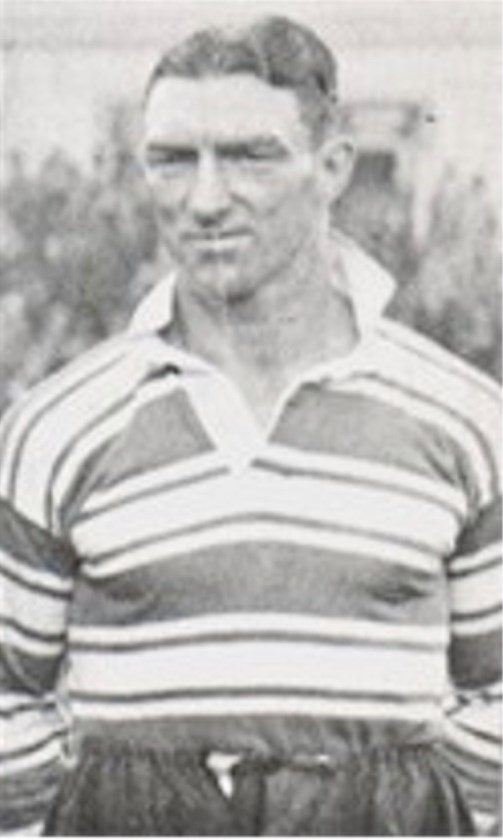
Bailey led the side through the war years, recommencing his role as Captain-Coach briefly in 1944, before handing over his coaching duties to Cec Fifield.
His fortunes would change the following season, gaining selection for New South Wales and playing four matches, captaining the state in 1946 before earning the distinction as the first Canterbury player to play for Australia.
In his second and final Test for Australia, he also became the first player from Canterbury-Bankstown to captain the Kangaroos, before returning to Newcastle following his final and arguably best season in Belmore.
Named at centre for the Berries to Bulldogs 70-Year Team of Champions in 2004, Bailey was also inducted into the Bulldogs Ring of Champions in 2007.
Greg Brentnall (1977-1983)
A Country representative in 1975-76, Greg Brentnall (Bulldog no.423) joined Canterbury in 1977 as a fullback, overcoming early injuries to become a star at State and International level, playing seven games for New South Wales and 13 Tests respectively.
Moving to the centres in 1979, he featured in the semi-final against Cronulla, before a broken arm prevented him from playing in the Grand Final against St George.
His breakthrough year in first-grade came in 1980, where he made his debut for NSW and for Australia, and featured at fullback in 'The Entertainers' Premiership winning side in 1980.
Brentnall took a permanent hold of the Bulldogs' no.1 jersey in 1981, winning the Rothmans Medal in 1982 and capping off the year as a member of 'The Invincibles' Touring side.
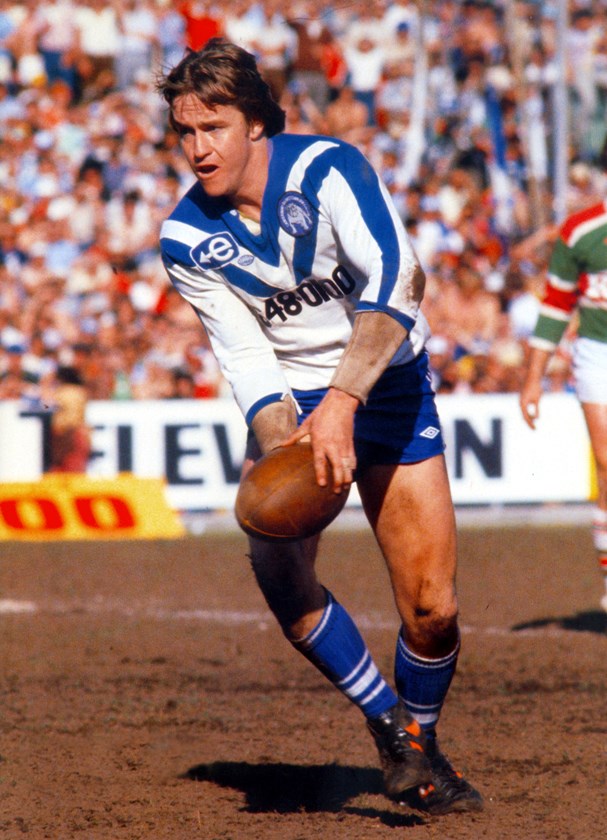
Despite being injured for most of the 1983 season, he featured in the Preliminary Final against Parramatta in what would be his 108th and final game for the Bulldogs.
Fondly remembered for his brilliant kicking game highlighted by his left-footed drop outs, 50-metre punts and clutch penalty goals, Brentnall was named as a reserve in the Berries to Bulldogs 70-Year Team of Champions, before being inducted into the Bulldogs Ring of Champions in 2007.
Following his football career, he held positions as a Development Officer in the Riverina, while assisting former teammate Chris Anderson as a Development Manager at the Melbourne Storm.
Eddie Burns (1935-1950)
Eddie Burns (Bulldog no.16) is one of the true immortals of the Canterbury-Bankstown Club.
A local junior, Burns was a member of the inaugural side in 1935 and played in the Club's very first reserve grade match, before making his first-grade debut in Round 3 against Balmain.
A mobile and tough prop forward, Burns gained a reputation for his try scoring ability mainly through his support play - his record of 62 first-grade tries remained until he was overtaken by flying winger Chris Anderson in 1980.
He was also part of a formidable front row combination with Henry Porter and Roy Kirkaldy. Together the 'Three Musketeers' played in 94 games together from 1938 to 1948.
A member of the Club's inaugural semi-final clash in 1936, Burns was a Premiership winner in 1938 and 1942, as well as a member of the City Cup winning team of 1939 while also playing in the 1947 Grand Final.
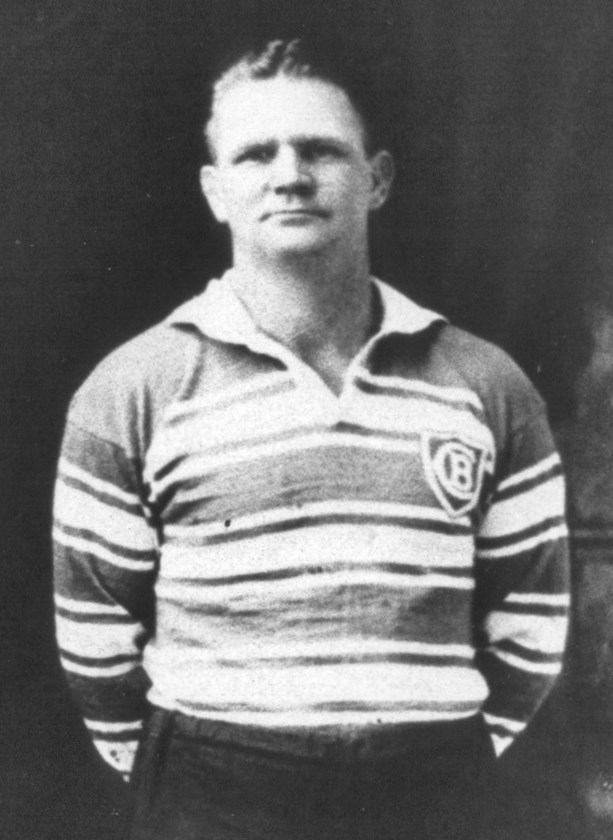
Following retirement, Burns coached the Reserve Grade team to the Grand Final in 1952, before steering the first-grade side back to the semi-finals in 1960 following a thirteen-year absence. His run of silverware continued in 1962 when the side won the inaugural pre-season competition.
Becoming a Life Member of the Club and the NSWRL, he coached NSW from 1963 to 1965 and was manager of the Australian team that toured New Zealand in 1969. His role in administration saw him take the position of Club President in 1967 and 1968.
After his passing in June 2003 at the age of 87, Burns was posthumously named at prop in the Berries to Bulldogs 70-Year Team of Champions in 2004. On April 1 2007, he was inducted into the Bulldogs Ring of Champions.
On 1st August 2015, Burns was inducted in the Canterbury-Bankstown Hall of Fame as part of the Club's 80th Year celebrations.
Steve Folkes (1978-89, 1991)
Abeloved clubman, coach and figure, Steven Folkes (Bulldog no.432) holds a distinguished place in Canterbury-Bankstown's long and esteemed history.
A local junior with Bankstown Sports, Folkes rose to grade in 1977, becoming a regular member of the Under 23s team as a halfback, before moving further infield with his rise through the Club's system.
During his time in reserve grade, he set the record for most tries in a game with four before getting an opportunity in first-grade to debut as a replacement against South Sydney in 1978.
In 1979, Folkes became a regular member of the first grade team, featuring in the Grand Final against St George, before moving into the second row on a full-time basis and becoming a Premiership winner in the famous 1980 triumph.
He remained a consistent performer for the Bulldogs in the early 1980s, becoming the side's 'Mr Fix-It' and filling in where required; highlighting his team-first mentality.
His first of sixteen games as Captain came in 1984, the same year he would help Canterbury lift the Premiership trophy, doing so again the following season where he was awarded Life Membership of the Football Club.
Folkes' on-field contributions to the Bulldogs were awarded when he debuted for NSW and Australia in 1986, going on to play nine games for the Blues and five Tests for the Kangaroos.

Another Premiership victory came in 1988 against Balmain, while Folkes' commitment to the Canterbury cause saw another personal milestone achieved in 1989, where he became the first player since 1935 to achieve 300 Club games.
Despite a brief stint at Hull FC in England's north in the 1989-90 off-season, Folkes returned for one last hurrah in Belmore, with his 245th and final first-grade match in coming in the fifth-place playoff against Western Suburbs.
Steven continued with the Club as a trainer and was appointed Reserve Grade coach in 1996, leading the team to win the reserve grade Super League Grand Final against Auckland.
In 1998, Folkes was appointed first grade coach, finding early success as his team reached the Grand Final against Brisbane after qualifying 9th - which remains as the only side in history to do so.
Folkes successfully navigated a tumultuous period for the Club between 2002-2004 to bring the Bulldogs back to Premiership glory in 2004. In doing so, he became just the second individual to win a Grand Final as player and coach for Canterbury alongside brother-in-law Chris Anderson, claiming the Dally M Coach of the Year Award in the process.
Folkes' esteemed tenure as coach finished in 2008, culminating in 288 games, 162 wins for a 56.3% win rate, seven finals appearances, two Grand Finals and a Premiership as the longest-serving mentor in Club history.
In 2004, he was named in the Berries to Bulldogs 70-Year Team of Champions in the second row, before being inducted into the Bulldogs Ring of Champions in 2007.
On 11th February 2025, he was posthumously inducted in the Canterbury-Bankstown Hall of Fame as part of the Club's 90-Year Anniversary celebrations alongside Johnny Greaves and Hazem El Masri.
David Gillespie (1984-1990)
Affectionately named 'Cement', for his tough and uncompromising style, David Gillespie (Bulldog no.485) had a reputation as one of the hardest-hitting players in the competition's history, and was a cornerstone of the 'Dogs of War' pack in the mid-late 1980s.
Arriving at the Club in 1983 as a second rower, he became a regular in the reserve grade side before making his first-grade debut the following season against Western Suburbs.
Replacing the injured Peter Tunks, Gillespie remained in first-grade for the following six seasons from 1985 onward, and was a replacement in the Grand Final winning side that defeated St George in the decider.
Despite losing a finger in a horrific work accident, which saw him miss both that year's finals series and the Kangaroo Tour, Gillespie made his State of Origin debut for NSW in 1986, before enjoying Premiership glory for the Bulldogs in 1988.
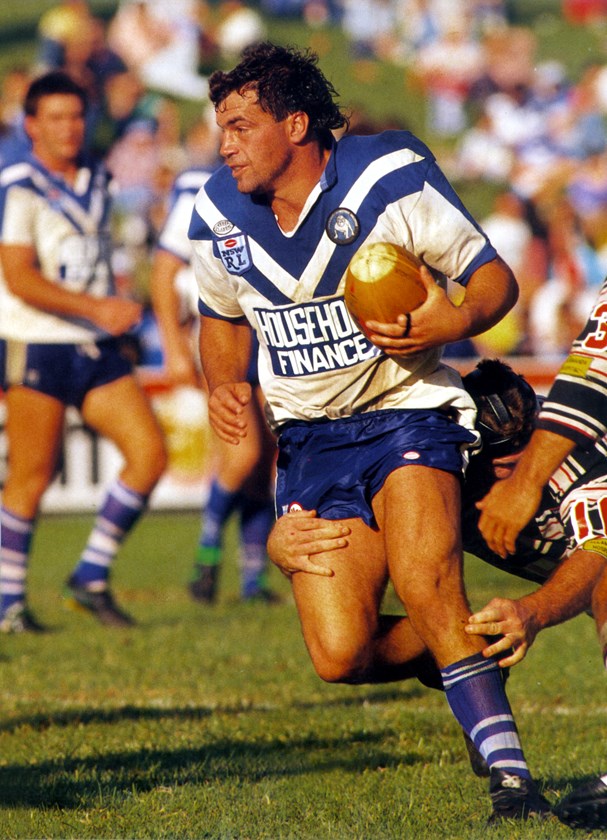
The end of the season earned the tough forward a Test debut for Australia in the 1988 World Cup, leading to the 1990 Kangaroo Tour after making a successful move to the front row.
Following his career at Canterbury, Gillespie's career continued at Western Suburbs and Manly - ironically playing against the Bulldogs in the 1995 Grand Final - before retiring at the end of the 1997 ARL season.
In total, Gillespie played 121 first-grade games for Canterbury, 15 State of Origin matches for NSW and 17 Tests for Australia in one of the great careers of the era.
He was inducted into the Bulldogs Ring of Champions on April 1, 2007, and was awarded Life Membership of the Football Club in 2024.
John Greaves (1964-1972)
Before his long and distinguished career at Canterbury, John Greaves (Bulldog no.303) featured in 28 games for St George between 1962 and 1963.
Looking for a permanent position in first-grade, something Canterbury could offer, Greaves also gained the opportunity to play under the legendary Clive Churchill.
Ironically, his move to Canterbury in 1964 saw him take on his former side in his first-grade debut for the Club, in his first of 112 matches in the Blue and White.
The following year Greaves stamped his name in first-grade, cementing a spot in the backline for the following seven years, before making his respective debuts for both NSW and Australia in 1966.
A member of the 1967-68 Kangaroos and a 1968 World Cup representative for Australia, Greaves went on to play 12 Tests and seven matches for his state.
It was the following year where he stamped his name in first-grade, cementing a spot in the centres for the following seven years, before making his respective debuts for both NSW and Australia in 1966.
A member of the 1967-68 Kangaroos and a 1968 World Cup representative for Australia, Greaves went on to play 12 Tests and seven matches for his state.
Helping guide the 'Berries' to the 1967 Grand Final - their first in 20 years - Greaves continued his strong form for the Club, despite being struck down by injury in 1969.
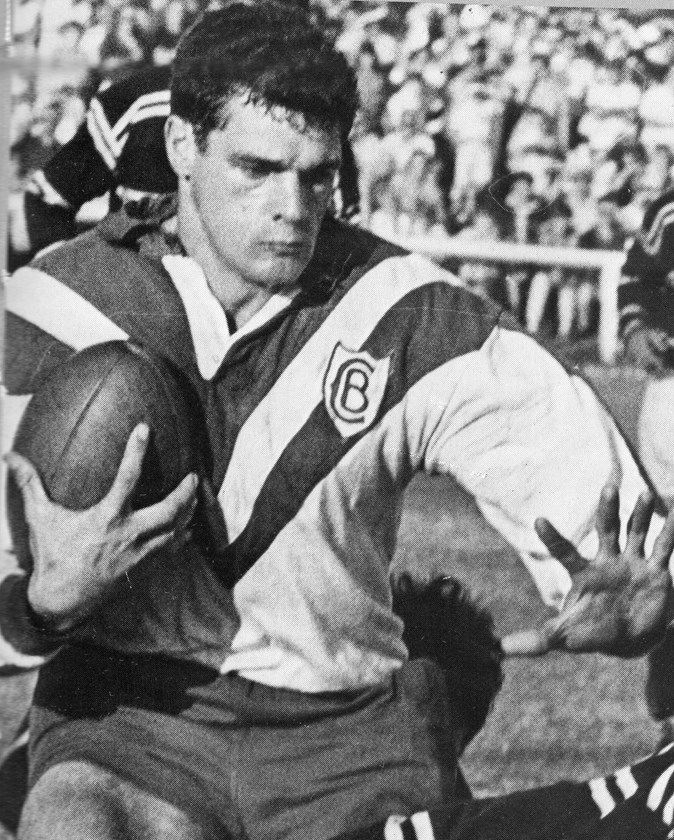
The accolades continued for the striking centre in the early 1970s, where he was named Captain of Canterbury-Bankstown for the 1971 season, leading the side out on 34 occasions until his final season with the Club the following year.
Season 1972 saw Greaves finish his career at Belmore on a high, recording a personal tally of 13 tries from 21 matches. He played his 112th and final match for the Club against Penrith in Round 22, kicking five goals in the 19-12 victory.
In 1973, he joined the Campbelltown club as Captain-Coach, representing Country Firsts before retiring from the game at the end of 1975.
Greaves was named in the centres alongside Premiership-winning Captain Ron Bailey in the Berries to Bulldogs 70-Year Team of Champions in 2004, before being inducted into the Bulldogs Ring of Champions in 2007.
On February 11, 2025, he was inducted in the Canterbury-Bankstown Hall of Fame as part of the Club's 90-Year Anniversary celebrations.
Les Johns (1963-1971)
Arriving at Belmore from Newcastle, goal-kicking sensation Les Johns (Bulldog no.284) proved to be a shining light during one of the more quiet periods in the Club's history.
Highly skilled with the boot with an ability to tackle and run like a greyhound, Johns - despite featuring in just 103 first-grade games for the Club - proved to be one of the greatest fullbacks in the game, and was renowned as a dynamic match winner.
So highly regarded was he when a selection panel sat down to pick the 'Rugby League Team of the '60s' in 2006 that he was given the nod as fullback over highly favourable picks Keith Barnes, Ken Thornett and Graeme Langlands.
Following a representative appearance for Country in 1961 and selection for Newcastle against Great Britain in 1962, the fleet-footed fullback arrived at Belmore the following year after making his debut for New South Wales.
Quickly establishing himself in first-grade in a season where Canterbury finished third from the bottom, Johns' form was so irresistible to selectors that he wore both the sky blue of NSW and the green and gold of Australia.
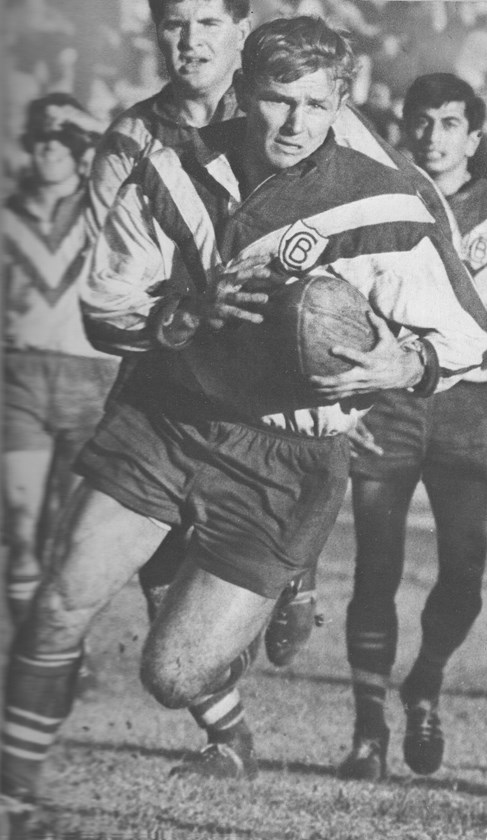
Totalling 16 matches for NSW and 14 Tests for his country, Johns' prowess with both ball in hand and in defence saw him selected on the 1963-64 and 1967-68 Kangaroo Tours, as well as the 1965 and 1969 New Zealand Tours.
He soon found himself with the 'C' next to his name in the Blue and White after filling in for sidelined Captain Ray Gartner in just his second season, captaining the side until 1966.
Despite missing a majority of the 1967 season, Johns returned in time to feature in the Club's first Grand Final in two decades.
His most consistent season came in 1969, where he played 18 matches and scored in all but one as he tallied 138 points. Following two injury-affected seasons, his glittering career ended in 1971.
Considered the Club's greatest-ever fullback, Johns was named in the Berries to Bulldogs 70-Year Team of Champions in 2004 and on April 1, 2007, was inducted into the Bulldogs Ring of Champions.
Alongside fellow Bulldogs Hall of Famers Steve Mortimer and Terry Lamb, Johns was named in the 100 Greatest Players as part of the NRL's Centenary year celebrations.
In 2011, he was bestowed with Life Membership of the Football Club, before being inducted in the Canterbury-Bankstown Hall of Fame as part of the Club's 80th Year celebrations on August 1, 2015.
Peter Kelly (1984-1987)
Peter Kelly (Bulldog no.476) joined Head Coach Warren Ryan as an arrival from Newtown in 1984, etched himself as one of the Club's greatest ever forwards.
Kelly solidified his spot as a regular first grader immediately, featuring in the front row in the 1984 Grand Final - claiming Man of the Match honour - finishing his first season as a Premiership-winner.

His herculean effort was backed up the following season as 'The Dogs of War' claimed back-to-back titles, while he featured in the narrow 6-4 defeat in the 1986 Grand Final.
After four seasons at Belmore, Kelly joined Penrith, playing two matches for New South Wales before retiring in 1990.
In 2004, Kelly was named as a reserve in the Berries to Bulldogs 70-Year Team of Champions, and was later inducted into the Bulldogs Ring of Champions in 2007.
Roy Kirkaldy (1938-1948)
After playing 14 seasons for Waratah Mayfield, Roy Kirkaldy (Bulldog no.57) joined Canterbury as a 28-year-old, and would go on to play 11 seasons for the Club until the age of 38.
A prolific ball winner, Kirkaldy's influence in the scrum turned Canterbury into a dominant force over a long period, so much so that he was bestowed the nickname 'The Prince of Hookers'.
He was a member of the formidable combination known as 'The Three Musketeers' alongside front rowers Eddie Burns and Henry Porter, with the trio playing 94 games together between 1938 and 1948.
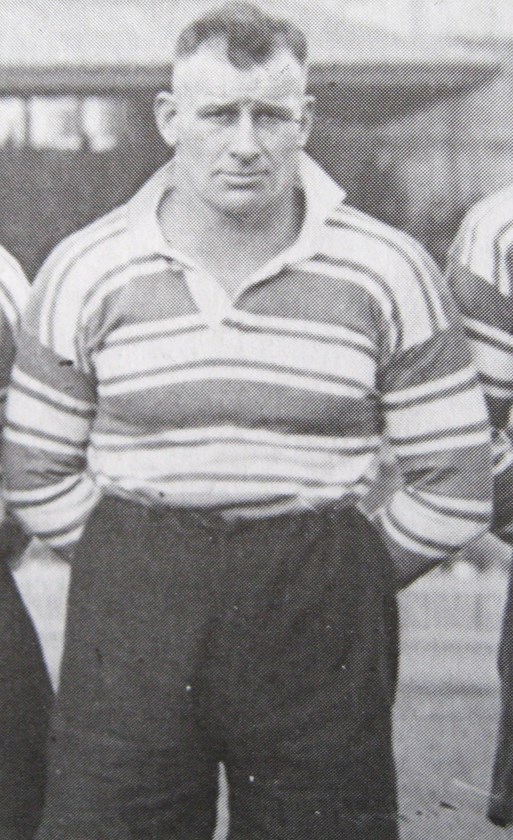
Alongside Burns and Porter, Kirkaldy would go on to win the Club's first Premierships in 1938 and 1942, feature in the 1940 and 1947 Grand Finals while taking out the 1939 City Cup, with his prowess in the scrums a major factor in the side's change in fortunes.
The talented rake also played ten matches for New South Wales, while World War II prevented a potential call-up for Australian duties. He also took the mantle as Captain-Coach during 1943, in what was a difficult season due to the unavailability of players serving.
Following his passing at age 63 in 1973, Kirkaldy was posthumously named as a reserve for the Berries to Bulldogs 70-Year Team of Champions, before being inducted into the Bulldogs Ring of Champions in 2007.
Terry Lamb (1984-1996)
Following four seasons at Western Suburbs which culminated in being awarded the Dally M Player of the Year in 1983, local junior Terry Lamb (Bulldog no.477) came home to the Bulldogs and ushered in a new era of success at Belmore.
Arriving as part of a major recruitment drive, he took charge as the Bulldogs' regular five-eighth, and would hold the position for the next thirteen seasons.
Regarded as the game's greatest-ever support player, Lamb's influence helped spearhead the Bulldogs to back-to-back Premierships in 1984-85 (despite missing the 1985 Grand Final due to injury) and further title success in 1988 and 1995, the latter in which he captained.
His leadership came to the fore as well, captaining the side on 121 occasions - a record that he held for the best part of a decade and a half - while his point scoring and try scoring abilities saw him lead the competition for points in 1984 and 1986 while topping the try scoring charts in 1984 and 1987.
Lamb's extensive list of personal achievements also include being named the 1984 Rothmans Medallist, winning the Dally M Players' Player of the Year in 1984, 1986 and 1995 as well as claiming a record seven Dally M Five-Eighth of the Year awards.
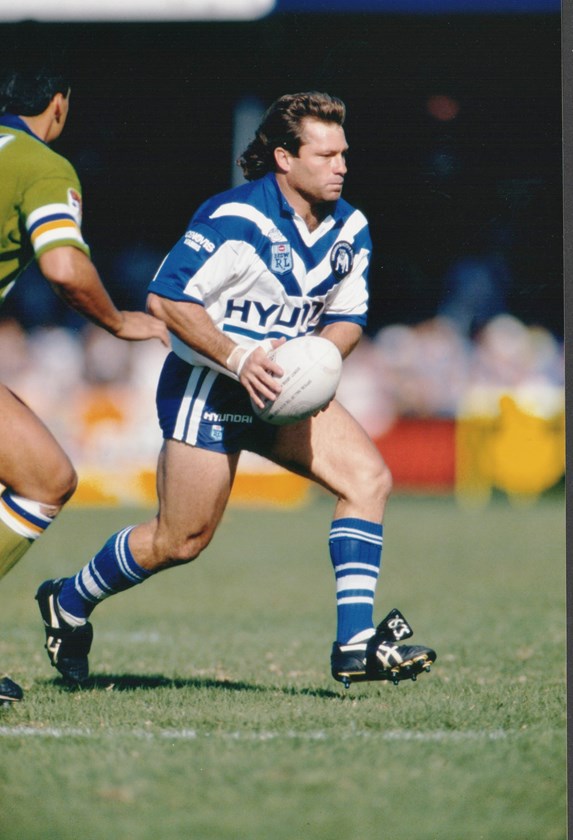
Cunning and deceptive with the ball in hand, Lamb shone on the representative stage as well, playing eight State of Origin games for for NSW and seven Tests for Australia. He holds the unique distinction of playing all 20 games on the 1986 Kangaroo Tour, further highlighting his durability in the toughest arenas.
He was officially appointed as the Bulldogs' captain in 1990, with the 'C' written next to his name for the next five seasons.
Despite a brief lull following the success of the 1980s, the man affectionately known as 'Baa' led the Blue and Whites to the Minor Premiership in 1993, becoming the first Canterbury player to score 100 first-grade tries in the process.
After missing half of the 1994 season due to a broken arm, the tenacious no.6 returned to the field to guide the Bulldogs to another Minor Premiership and their first Grand Final since the 1988 triumph.
With the Super League War looming and the code's future in limbo, Lamb's leadership shone through the 1995 season, where he led the sixth-placed Bulldogs to glory following a courageous 17-4 victory over Manly in the Grand Final.
While he initially retired following the match, the Greenacre junior went around again one last time in 1996, while breaking the competition record for most first-grade appearances with 349 (later corrected to 350) - a mantle he held until 2011.
Following retirement, Lamb swapped the boots for the clipboard, enlisting as the Club's reserve grade coach and claiming titles in 1998 and 2000 before becoming the Wests Tigers' first-grade coach in 2001 and 2002.
In 2004, he was named Captain and Five-Eighth of the Berries to Bulldogs 70-Year Team of Champions.
On April 1, 2007, he was inducted into the Bulldogs Ring of Champions and on February 22, 2008, was named in the 100 Greatest Players as part of the NRL's Centenary celebrations.
On August 1, 2015, Lamb was inducted in the Canterbury-Bankstown Hall of Fame as part of the Club's 80th Year celebrations.
Peter Moore OAM (Administrator, 1969-1995)
Peter 'Bullfrog' Moore is undoubtedly the most influential figure in the Club's long and proud history.
From his humble beginnings as a clerk at Belmore Newsagency, Moore was the catalyst of 'The Reformation' in 1969 following the failed signing of Test winger Lionel Williamson.
Heading the reform group alongside Captain-Coach Kevin Ryan, Moore took over as secretary manager of the Canterbury League Club a month after the landslide win.
It could be argued that Moore's influence over the Club - where he both acted in administration and proved to be a lynchpin in recruitment - directly led to the Club's unparalleled success throughout the mid-70s to mid-90s.
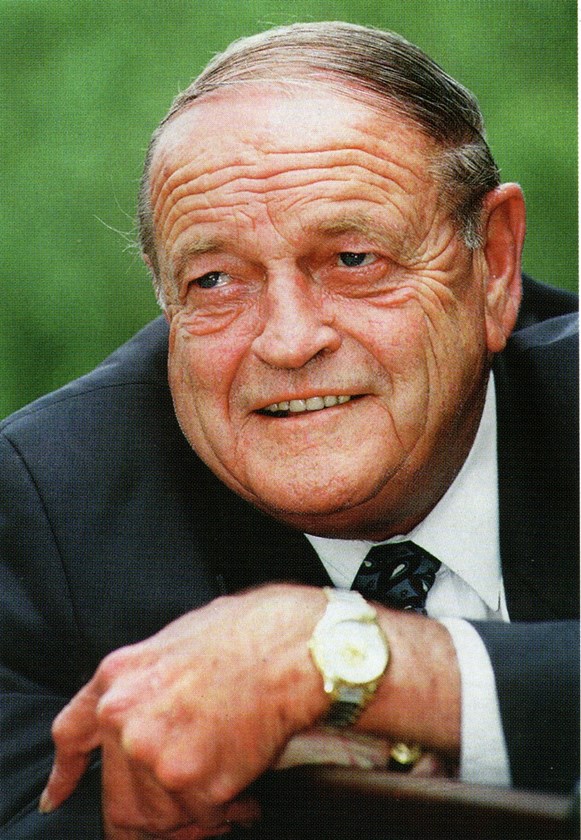
Moore was renowned for his innovations off the field too; implementing Club grants to support players through scholarship schemes, while his fostering nature built the Bulldogs the reputation as 'The Family Club'.
Under his tenure from 1969-1995, the Bulldogs featured in nine Grand Finals and claimed five titles during the most successful period in Club history.
Moore resigned from his position following the 1995 Premiership victory during the bitter 'Super League War', leaving one of the greatest legacies in his 26 years at the helm. Following a long battle with cancer, Moore passed away in 2000 at the age of 68.
A Life Member of the Club, Moore was posthumously named in the Administrator position in the Berries to Bulldogs 70-Year Team of Champions in 2004 before being inducted into the Bulldogs Ring of Champions in 2007.
Chris Mortimer (1978-1987)
The third Mortimer brother to debut for the Club, Chris (Bulldog no.433) joined the Bulldogs in 1978 as a centre, rising through the grades and quickly establishing himself in Ted Glossop's side.
After featuring in the 1979 Grand Final, Mortimer, alongside brothers Peter (his fellow centre) and Steve, helped 'The Entertainers' break the Club's 38-year drought in the emphatic 1980 Premiership triumph.

His versatility was a valuable asset during the Club's most successful period, featuring in the second row, at fullback and five-eighth in a pinch, while his goal-kicking proved to be the difference in the 1984 Grand Final victory, which saw him calmly slot the winning goal.
A New South Wales and Australian representative, 'Louie' was also a member of the 1985 Premiership-winning side and later featured on the 1986 Kangaroo Tour, and he finished his career at Belmore in 1987 with an impressive 193 first-grade appearances.
A Life Member of the Club, Mortimer was named as a reserve in the Berries to Bulldogs 70-Year Team of Champions in 2004 before being inducted into the Bulldogs Ring of Champions in 2007.
Steve Mortimer (1976-1988)
According to many, Steve Mortimer (Bulldog no.413) was destined to play his entire first-grade career as a Bulldog.
After playing his junior league in Turvey Park, Wagga Wagga (where his nickname would derive), Mortimer's first-class debut ironically, came against Canterbury in the 1975 AMCO Cup.
A last-minute replacement at halfback for Riverina, Mortimer's man of the match performance was so impressive that Club supremo Peter Moore correctly predicted that he "will never play against Canterbury-Bankstown ever again".
Joining the Club the following season, the clever halfback owned the Bulldogs' no.7 jersey for thirteen seasons, proving to be the backbone of the side alongside brothers Peter and Chris through an unparalleled era of success.
A threatening runner of the ball with a penchant for the elusive chip and regather, which resulted in tries more often than not, Mortimer formed an unbreakable combination alongside five-eighth Terry Lamb.
He was also renowned for this prowess on the opposite side of the ball, notorious as a cover defender with his copybook tackling that more often than not felled opponents twice his size.
His impact on the competition was immediately acknowledged by selectors, earning his first start for NSW in 1977, where he would total 15 appearances in sky blue and famously captain the Blues to their first State of Origin series win in 1985.
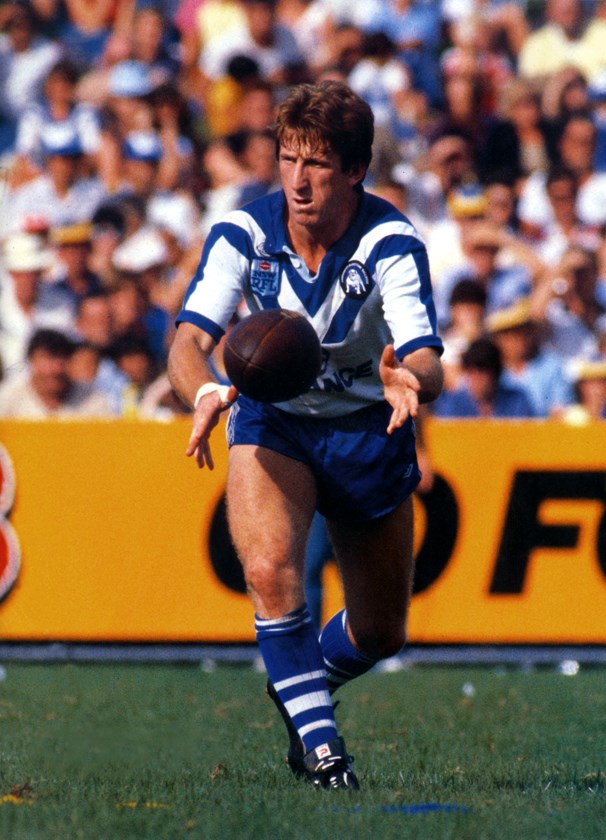
After falling short in 1978 and 1979, Mortimer was a key figure in the Bulldogs' drought-breaking Premiership victory in 1980 against Eastern Suburbs.
He was rewarded for his strong performances in 1981 after appearing in every match for Canterbury-Bankstown with Test selection, before going on to become a member of the 'Invincibles' on the 1982 Kangaroo Tour.
In mid-1984, Head Coach Warren Ryan bestowed Mortimer with the Bulldogs' captaincy, a role he would thrive in over the next four seasons.
Commanding 'The Dogs of War', the clever playmaker shone through the mid-1980s, leading the side to consecutive Premiership victories in 1984 and 1985 in arguably the finest moments of his career.
While injury threatened to derail his career, 'Turvey' bounced back from a broken arm in 1988 to take his place in the Grand Final victory against Balmain as a replacement, in a fitting end for one of the greatest Bulldogs.
At year's end he was bestowed with Life Member of the Football Club, while his contributions to the Club would go beyond the playing field, taking up roles as Chief Executive from 2002 to 2004 and a member of the Football Club Board from 2014-2019.
In 2004, Mortimer was named Halfback of the Berries to Bulldogs 70-Year Team of Champions.
On April 1, 2007, he was inducted into the Bulldogs Ring of Champions and on February 22, 2008, named in the 100 Greatest Players as part of the NRL's Centenary celebrations.
On August 1, 2015, Mortimer was inducted in the Canterbury-Bankstown Hall of Fame as part of the Club's 80th Year celebrations.
Edgar Newham (1938-43, 1945, 1948)
Regarded as one of the finest wingers in Club history, Edgar Newham (Bulldog no.58) joined Canterbury in 1938 and quickly secured a spot in the first-grade side with his uncanny try-scoring abilities.
Lightning quick and with a tall frame, Edgar was a member of the 1938 and 1942 Premiership-winning sides, and featured in the 1940 final, while it was only injury that prevented him from featuring in the 1939 City Cup victory.
Arguably his finest moment came in the 1942 play-off against Balmain in a tussle for first place honours, where he scored a Club record five tries - equalled only by Nigel Vagana - to spearhead Canterbury to a 26-20 victory.
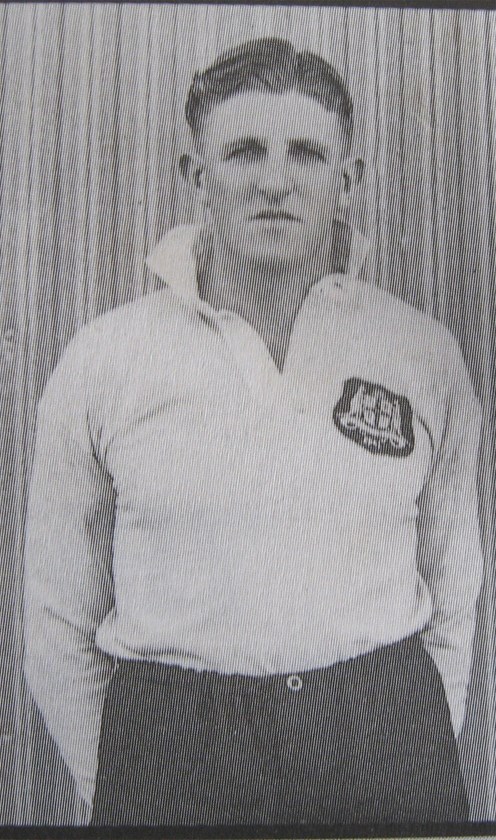
From 1941-1946, Newham featured five times for New South Wales, and while he returned to his hometown of Cowra (where he went on to qualify for the Australian side), he made a comeback in 1948 for one final season at the age of 34 in 1948.
Following his passing in 1995, aged 81, Newham was posthumously named as a winger in the Berries to Bulldogs 70-Year Team of Champions, and later inducted into the Bulldogs Ring of Champions in 2007.
George Peponis (1974-1982)
Local junior George Peponis (Bulldog no.402) joined Canterbury in 1972 as a hooker after initially playing rugby while at Canterbury Boys High School.
In 1973, George became a regular member of the Under 23s team and played in the Preliminary Final against Balmain. The following year, he made a meteoric rise to first grade, making his debut before playing through the finals series, featuring in that year's Grand Final against Eastern Suburbs.
Season 1975 saw George sidelined with a broken leg, before returning to the field in time to feature in the finals, including the reserve grade Preliminary Semi-Final.
From 1976 he held the hooker spot for five seasons, making his debut for NSW and helping take Canterbury to that year's Preliminary Final.
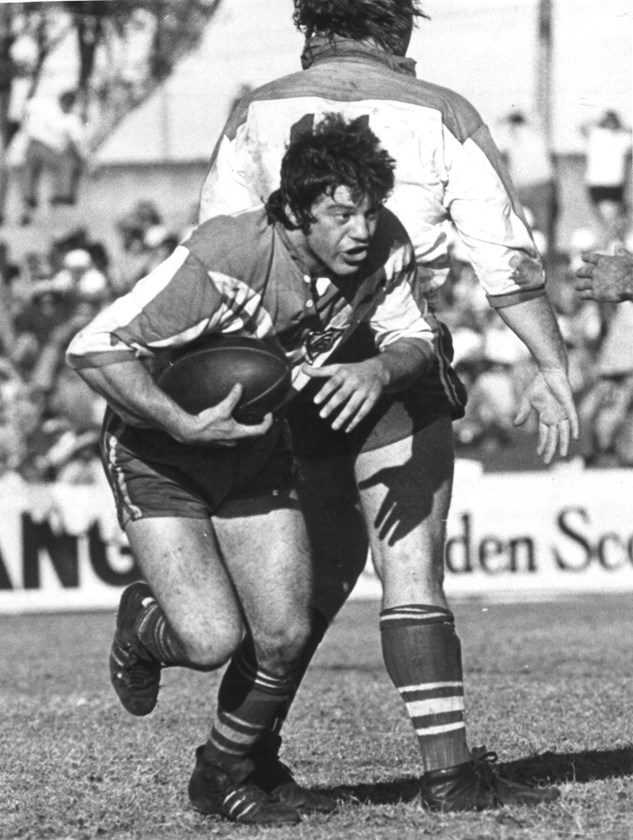
Further representative honours would come for Peponis, playing eight games for NSW and Captaining Australia in five Tests in the 1978 Kangaroo Tour and 1980 Tour of New Zealand.
He holds the distinction as the first Canterbury junior to play for Australia while at the Club, the first to captain Australia and the first to captain Australia in a three-Test whitewash of the British.
After an injury-riddled 1977 drsdon, he was appointed first-grade Captain the following season, guiding the side to 1979 Grand Final against St George.
Season 1980 proved to be a significant one for George, as he led the Bulldogs to the Club's first Premiership win since 1942 with a dominant 17-4 Grand Final victory over Easts.
Following retirement in 1982, Peponis was awarded Bulldogs Life Membership, and later held a role as Chairman of the Football Club Board, helping the Club navigate its way through the salary cap dramas in 2002.
Peponis was named at Hooker in the Berries to Bulldogs 70-Year Team of Champions in 2004, before being inducted into the Bulldogs Ring of Champions in 2007.
On 1st August 2015, he was inducted in the Canterbury-Bankstown Hall of Fame as part of the Club's 80th Year celebrations.
Henry Porter (1936-42, 1944, 1946-48)
Aptly nicknamed 'Tarzan' owing to his strong physique, Henry Porter (Bulldog no.37) joined Canterbury in 1936, and was one of the key figures in the Club's early success.
A Premiership winner with Newtown, Porter arrived at Belmore via Goulburn as a New South Wales representative, and would hold down the front row position for the following twelve seasons, interrupted only with a brief stint in Brisbane.
The hulking front rower was a member of the formidable 'Three Musketeers' front row combination alongside fellow Ring of Champions members Eddie Burns and Roy Kirkaldy.
The trio combined for 94 appearances from 1938 to 1948 at Canterbury, which included Premiership victories in 1938 and 1942, as well as the City Cup title of 1939 and the 1947 Grand Final, with Porter captaining the side on that occasion.
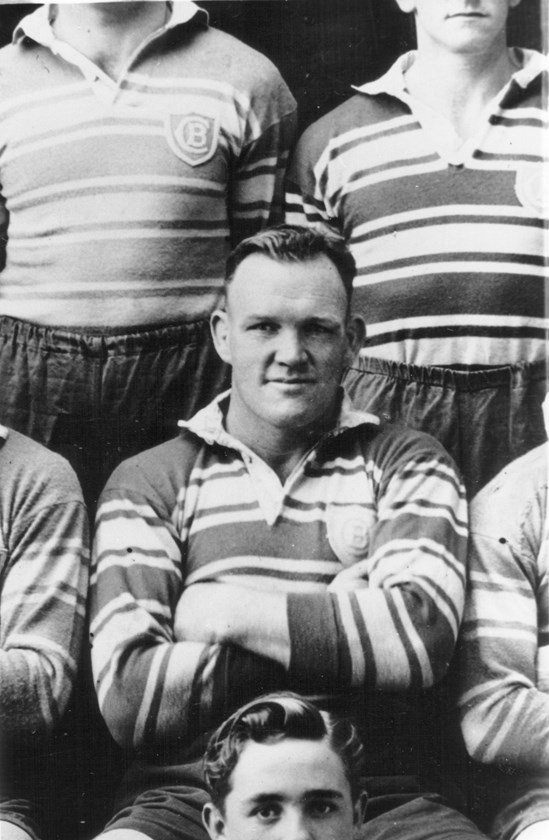
Porter had the rare feat of appearing in the Club's very first semi-final in 1936 against Easts at Belmore Sports Ground, while unfortunately, suspension rubbed him out of the 1940 decider.
The legendary forward also holds the rare distinction of playing for both New South Wales (14 games from 1935-1941) and Queensland (two games in 1945).
Following his playing career, which saw him amass an impressive 139 first-grade appearances for Canterbury-Bankstown, Porter returned to Coach the Club in 1949, later becoming a selector for the NSW and Australian sides of the 1960s and 1970s.
In 2004, Porter was posthumously named as a reserve for the Berries to Bulldogs 70-Year Team of Champions. On April 1 2007, he was inducted into the Bulldogs Ring of Champions.
Steve Price (1994-2004)
Steve Price (Bulldog no. 594) found himself in Belmore in 1993 as a fledgling second rower from Queensland, and would go on to carve out one of the great careers at the turn of the century.
A regular member of the Under 21s team, Price shot through the grades at the Bulldogs, making his first-grade debut against Balmain in Round 14, 1994, with his whirlwind debut season culminating in a Grand Final appearance against Canberra.
It wouldn't take long for the headgear-clad forward to experience Premiership glory; just one year later he crashed over for the first try in the famous 1995 Grand Final triumph.
His State of Origin and International debut came soon after in 1998, where he would go on to play 20 games for the Maroons and make nine Test appearances for Australia following another season that saw the Bulldogs reach the decider.
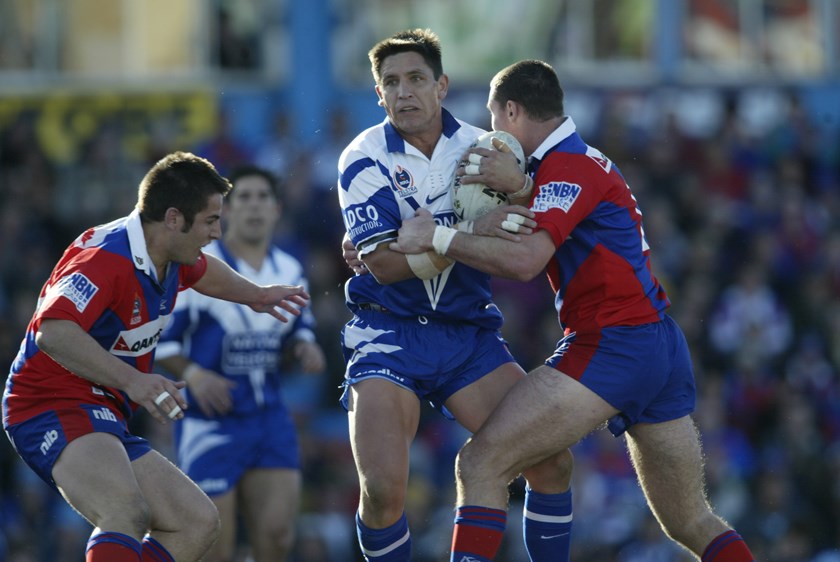
The turn of the century saw Price move into the front row on a full-time basis, while he was named Captain of the Bulldogs in 2002, navigating the side to a Club record 17 consecutive appearances.
His leadership qualities shone through a period of turbulence, where he guided the Bulldogs to the 2004 Grand Final, however an injury in the Preliminary Final - his final match for the Club - robbed him of a chance to take the field.
Following 222 matches for the Club, 68 of which were Captain, Price finished his career in New Zealand.
Prior to his departure, he was chosen as a reserve for the Berries to Bulldogs 70-Year Team of Champions, while he was inducted into the Bulldogs Ring of Champions in 2007.
A Bulldogs Life Member, Price also served on the Football Club Board, and also held a position as Bulldogs General Manager of Football.
Kevin Ryan (1967-1969)
An Australian rugby union representative and St George Premiership winner, Kevin Ryan (Bulldog no.323) played a major role in the Club's changing fortunes in the late 1960s.
A tough as teak prop forward, Ryan arrived at Canterbury in 1967 following an impressive career at the Dragons, which saw him win six consecutive Premiership titles, play nine matches for New South Wales and two Tests for Australia.
Taking over as Captain-Coach, Ryan's success and influence quickly rubbed off on his Canterbury teammates, who ended St George's 11-year Premiership run en route to the Club's first Grand Final appearance in two decades.
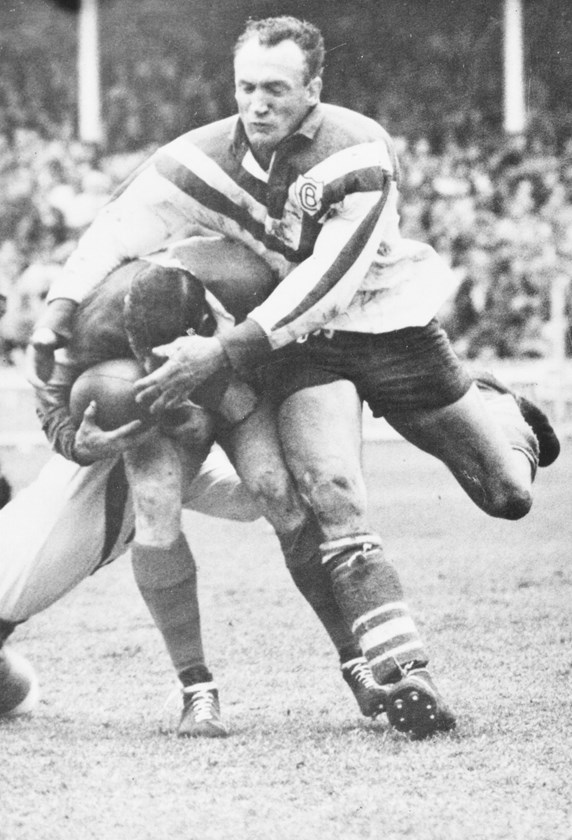
Retiring midway through the 1969 season, Ryan upheld his role as Coach, leading the side to a Pre-Season Competition victory in 1970 and another semi-final campaign.
After retiring to focus on a career in law, he later served as a Member of Parliament in New South Wales and held a longstanding position as President of the Rugby League Player's Association.
In 2004, Ryan was named at prop for the Berries to Bulldogs 70-Year Team of Champions, before later being inducted into the Bulldogs Ring of Champions in 2007.
Frank Sponberg (1935-39, 1941-44)
Frank Sponberg (Bulldog no.12) is regarded as the Club's first great lock forward, and was a member of the inaugural squad of 1935.
A 1934 Premiership winner with Wests and a local junior with Lakemba and Punchbowl, Sponberg built a reputation as a mobile forward with strong defensive qualities and a high workrate.
While State and International accolades eluded him, despite being named twice as a reserve for New South Wales, Sponberg spearheaded Canterbury to claim its first two Premierships in 1938 and 1942 as well as the 1939 City Cup.
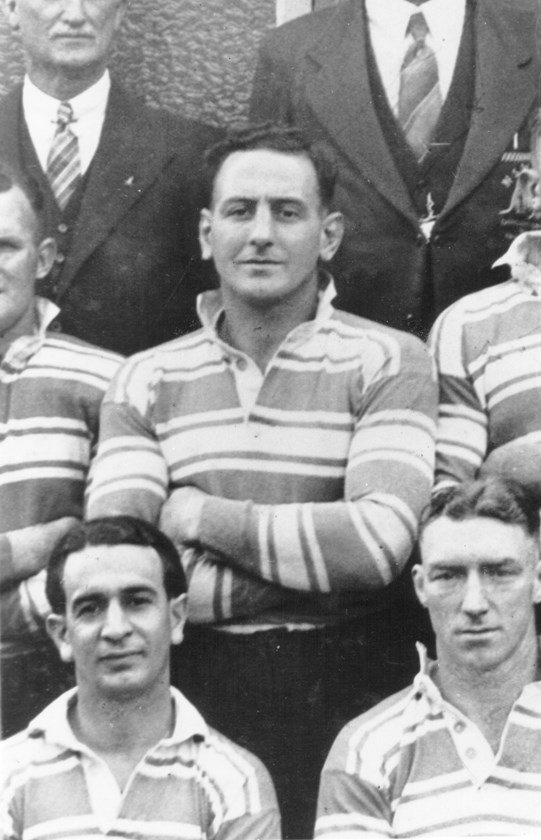
A leader on the field, his qualities saw him named Captain of the first-grade side on six occasions. Sponberg is also the father-in-law of Clive Gartner (Bulldog no.230).
At the age of 87, Sponberg passed away in June 2000.
In 2004, he was posthumously named at lock in the Berries to Bulldogs 70-Year Team of Champions, while also being named in the Bulldogs Ring of Champions on April 1 2007.
Canterbury-Bankstown Bulldogs 70-Year Team of Champions
| Name | Position |
|---|---|
| Les Johns | Fullback |
| Chris Anderson | Wing |
| Ron Bailey | Centre |
| Johnny Greaves | Centre |
| Edgar Newham | Wing |
| Terry Lamb (c) | Five-Eighth |
| Steve Mortimer | Halfback |
| Eddie Burns | Prop |
| George Peponis | Hooker |
| Kevin Ryan | Prop |
| Steve Folkes | Second Row |
| David Gillespie | Second Row |
| Frank Sponberg | Lock |
| Greg Brentnall | Reserve |
| Peter Kelly | Reserve |
| Roy Kirkaldy | Reserve |
| Chris Mortimer | Reserve |
| Henry Porter | Reserve |
| Steve Price | Reserve |
| Peter Moore | Administration |

Canterbury-Bankstown Bulldogs respect and honour the Darug and Eora nations, who are the Traditional Custodians of the land and pay our respects to their Elders past, present and future. We acknowledge the stories, traditions and living cultures of Aboriginal and Torres Strait Islander peoples on the lands we meet, gather and play on.